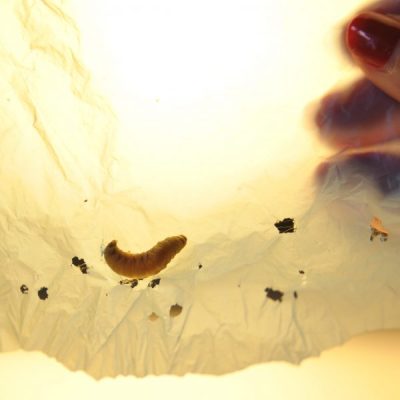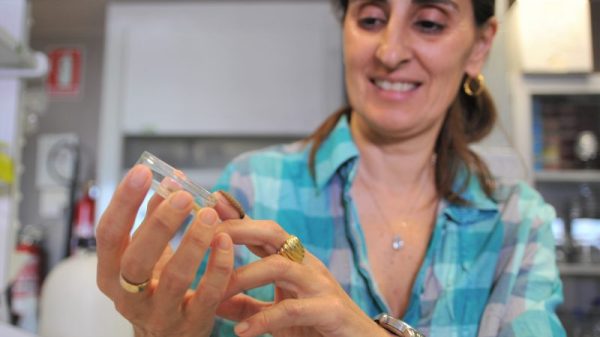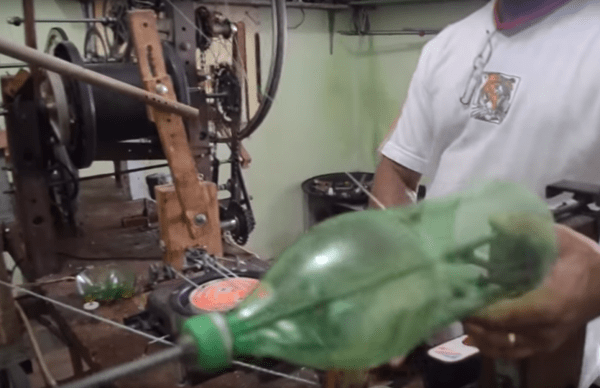It’s been a while since we’ve dunked on an autonomous taxi foul-up, mainly because it seemed for a while there that most of the companies field testing driverless ride-sharing services had either ceased operation or curtailed them significantly. But that appears not to be the case after a Waymo robotaxi got stuck in a Chick-fil-A drive-through. The incident occurred at the chicken giant’s Santa Monica, California location at about 9:30 at night, when the autonomous Jaguar got stuck after dropping off a passenger in the parking lot. The car apparently tried to use the drive-through lane to execute a multi-point turn but ended up across the entrance, blocking other vehicles seeking their late-evening chicken fix. The drive-through-only restaurant ended up closing for a short time while Waymo figured out how to get the vehicle moving again.
polyethylene terephthalate3 Articles
To Deal With Plastic Trash, All You Need Is Bugs
Outlawed now in some places, or only available to tote your purchases at a ridiculous premium, the billions of “T-shirt” bags used every year present a serious waste management problem. Whether blowing across the landscape like synthetic tumbleweeds, floating in the ocean as ersatz jellyfish, or clogging up municipal waste streams, finding a way to deal with them could really make a difference. And finding a bug that eats polyethylene and poops antifreeze might be a great first step in bioremediating the mess.
 As with many scientific discoveries, learning about the useful and unexpected eating habits of the larval stage of the Greater Wax Moth Galleria mellonella can be chalked up to serendipity. It began when biochemist [Federica Bertocchini] cleaned a wax moth infestation from her beehive. She put the beeswax-loving pests in a plastic bag, later finding they had chewed their way out. Intrigued, she and [Paolo Bombelli] ran some experiments using the bugs. They showed the mechanism wasn’t just mechanical and that the worms were digesting the polyethylene, to the tune of 92 mg consumed for 100 worms in 12 hours. That’s about 1,000 times faster than bioremediation with bacteria.
As with many scientific discoveries, learning about the useful and unexpected eating habits of the larval stage of the Greater Wax Moth Galleria mellonella can be chalked up to serendipity. It began when biochemist [Federica Bertocchini] cleaned a wax moth infestation from her beehive. She put the beeswax-loving pests in a plastic bag, later finding they had chewed their way out. Intrigued, she and [Paolo Bombelli] ran some experiments using the bugs. They showed the mechanism wasn’t just mechanical and that the worms were digesting the polyethylene, to the tune of 92 mg consumed for 100 worms in 12 hours. That’s about 1,000 times faster than bioremediation with bacteria.
Furthermore, the bugs excrete ethylene glycol, a useful industrial chemical, in the process. Finally, to see if the process can scale, the researchers showed that a homogenate of wax moth larvae could digest PE sheets. This could lead to an industrial process if the enzymes involved can be isolated and engineered. The letter describing the process is a fascinating read.
While this one may not a classically hackish way to deal with plastic recycling, the potential for this method is huge. We look forward to seeing where this goes.
[Images: César Hernández/CSIC]
Recycled Factory Recycles Soda Bottles
All over the world, mountains of polyethylene terephthalate (PET) plastics are available for recycling in the form of soda bottles. And wherever there is enough cheap raw material, a market is sure to emerge for it. One brilliant inventor in Brazil has decided to capitalize on this market by building a magnificent factory to turn PET bottles into threads, rope, and other products.
Not a word of English is spoken in the video, and our Portuguese stops at obrigado, but you don’t really need to understand what’s being said to know what’s going on. Built from what looks to be the running gear of several bicycles and motors from various cast-off appliances, our nameless genius’ machines slit the PET bottles into fine threads, winds the thread onto spools, and braids the threads into heavier cords. We love the whole home-brew vibe of the machines; especially clever is the hacked desk calculator wired to a microswitch to count revolutions, and the salvaged auto jack used to build a press for forming the broom heads. All in all it’s a pretty amazing little factory cranking out useful products from zero-cost raw material.
We’d love to have more context about what’s being said in the video, so we’ll put this one out there for our Portuguese-speaking readers. Maybe we can get a partial translation in the comments? If so, then obrigado.
[Thanks W4RIS]













